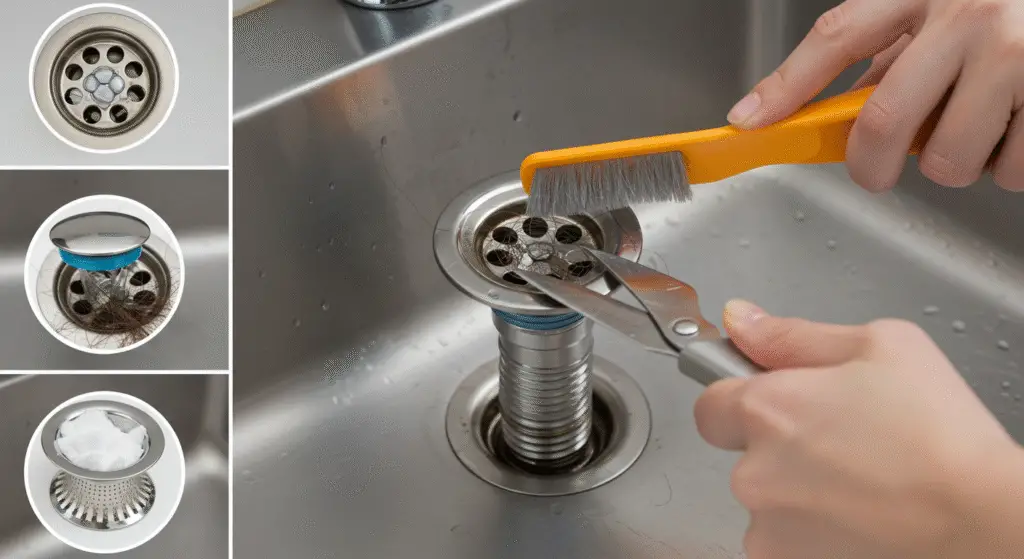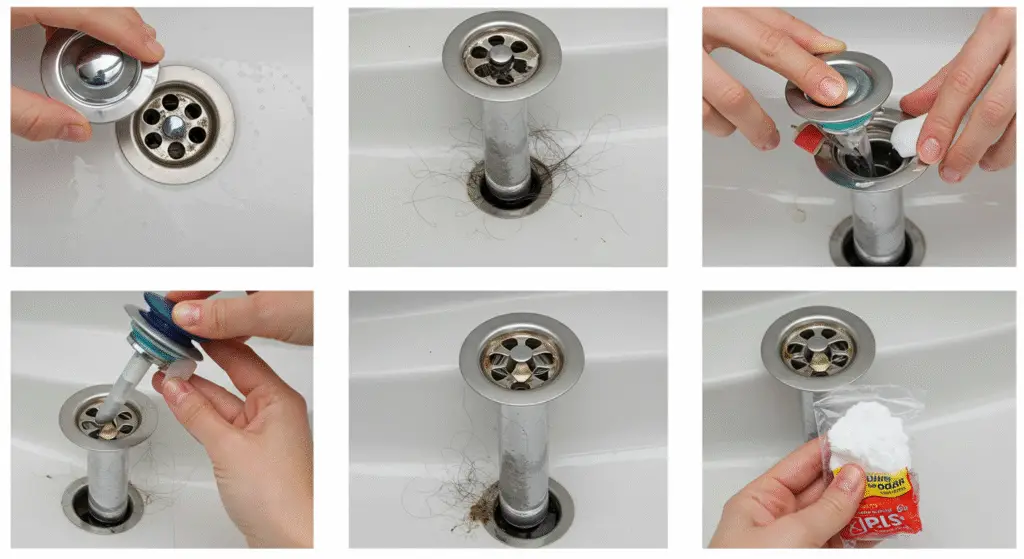
If you’re wondering how to clean sink drain quickly and easily without using harsh chemicals, you’re in the right place. Whether your sink is draining slowly or giving off a bad smell, a simple cleaning routine can make a big difference. Learning how to take care of your sink drain can save you money, time, and stress. In this post, we’ll walk you through natural and effective ways to clean your drain using everyday household items.
Why cleaning your sink drain is important
Your sink drain handles a lot — food scraps, soap, grease, toothpaste, and more. Over time, all of this builds up inside the pipes, causing slow drainage or bad odors. Sometimes it can even lead to full blockages.
By cleaning your drain regularly, you can:
- Prevent clogs
- Get rid of bad smells
- Save money on plumbing repairs
- Make your kitchen or bathroom feel cleaner overall
The good news is that cleaning a sink drain doesn’t take long or require special tools.
What you’ll need
Before we dive into the steps, here are a few basic things you’ll need:
- Baking soda
- White vinegar
- Hot water
- Dish soap
- An old toothbrush
- Rubber gloves
- A wire hanger or drain snake (optional)
These are all safe and easy to use. No strong chemicals needed.
Start with hot water
The first thing to try when cleaning your drain is simply hot water. Boil a kettle or a large pot of water. Slowly pour the hot water down the drain. This can help melt and wash away grease, soap, and small bits of food or dirt.
If you do this once a week, it can keep your drain clear and fresh without much effort.
Use dish soap for greasy build-up
Kitchen sinks often get clogged from grease and oil. These don’t go away easily with just water.
Try pouring a generous squirt of dish soap into the drain. Let it sit for a few minutes. Then pour in hot water slowly. The soap breaks down the grease while the hot water helps flush it away.
Doing this regularly helps avoid clogs caused by fats and oils.
Try the baking soda and vinegar method
This is one of the most popular and natural ways to clean a sink drain. It’s safe, gentle on pipes, and very effective.
Here’s how to do it:
- Pour half a cup of baking soda into the drain.
- Follow with one cup of white vinegar.
- Let the mixture fizz and bubble for about 10 to 15 minutes.
- After that, pour a full kettle of hot water down the drain to flush everything out.
This method helps break down build-up and can also reduce unpleasant smells.

Clean the stopper or drain cover
Sometimes the problem isn’t deep in the drain but right at the top. Hair, food bits, or soap can get stuck around the stopper or drain cover.
If your sink has a removable stopper, take it out. Scrub it well using dish soap and an old toothbrush. Rinse it under hot water, and put it back.
Even though this step seems small, it can make a big difference in how fast water drains.
Use a hanger or drain snake if needed
If you’ve tried hot water and vinegar but your sink is still slow, there may be a bigger clog deeper down. That’s when using a wire hanger or a simple drain snake can help.
Unbend a hanger and make a small hook on one end. Carefully insert it into the drain and try to pull up any hair or gunk that’s stuck.
If you have a drain snake, it works the same way but is designed for this job. Be gentle so you don’t damage the pipe.
Always finish by running hot water down the drain to wash away anything left behind.
Try plunging the drain
A sink plunger can also help dislodge a stubborn clog. Fill the sink halfway with water, place the plunger over the drain, and pump it up and down several times. If the water starts draining better, it means the blockage has moved or broken apart.
This is especially helpful if you notice water backing up in your sink.
Keep your sink drain clean with regular care
Now that your drain is clean, it’s important to keep it that way. Here are a few simple habits to follow:
- Don’t pour grease, coffee grounds, or food scraps down the sink.
- Use a drain strainer to catch debris.
- Run hot water after each use to clear soap and dirt.
- Use baking soda and vinegar once every week or two for maintenance.
- Clean the stopper at least once a month.
These small actions go a long way toward preventing bigger problems later.
Avoid using harsh chemicals
You might be tempted to use store-bought drain cleaners, but many of them contain harsh chemicals that can damage your pipes over time. They may work fast, but they aren’t always the safest option — especially if you have kids or pets in the house.
Natural solutions like baking soda, vinegar, and hot water are much safer and work just as well with regular use.
When to call a plumber
If none of these methods work and your sink is still draining slowly or not at all, the blockage may be too deep to handle yourself. This could mean there’s a problem in the main pipe, not just the drain.
In that case, it’s best to call a professional plumber. But in most cases, regular cleaning and maintenance will prevent things from getting to that point.
Final thoughts
Cleaning your sink drain doesn’t have to be hard or messy. Once you understand how to clean sink drain using simple, natural methods, you’ll feel more confident handling small plumbing problems on your own.
A little effort every week can save you a lot of trouble in the future. So next time your drain starts to smell or slow down, don’t panic — just grab some baking soda, vinegar, and hot water, and give your drain the care it deserves.
